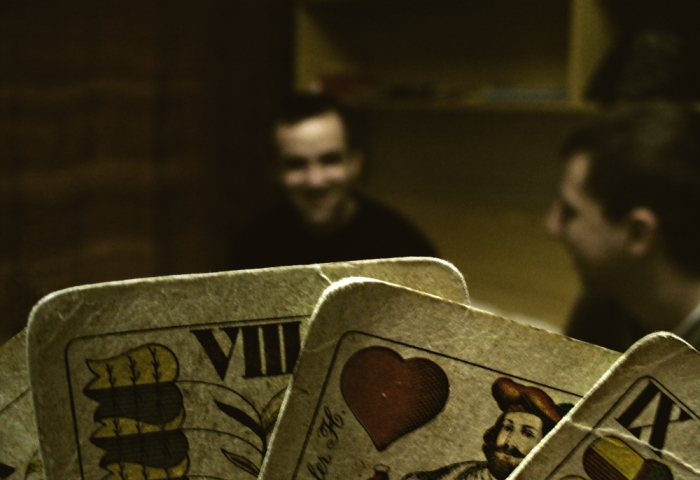(Pokemon Gamblers game)
So how do we define chance in gaming? Chance would be an element or an aspect of a game whose outcome is influenced by a randomizing device. A very simple example of this would be the drawing of cards from the deck in a card game.
(Card game)
Importance of Chance.
Having that aspect of the game which players cannot influence that is left to chance has its benefits.
- Solvability: that is to say that chance depending on how great of an influence it has over an outcome or several outcomes in a game can either reduce or completely eliminate the player finding patterns in the game that would otherwise let him/her master the game. This also helps to prolong interest in the game.
(I must say old chap, I am rather bored)
- Social Aspects: Chance can improve gaming socially, which we can all agree is a good ting because there is more fun when a game is socially engaging. By this I do not mean it makes everyone happy together, I mean it enables more people to enjoy participation. So how chance can do this would be allowing inexperienced players to win. Also player match-making is easier, because the opposing sides do not have to be around the same skill level to be able to win.
(Batman is really into it)
- Decision: that is to say chance plays a huge part in how we make decisions. When chance is involved the possible outcomes become far more than they would be if a solid pattern was followed. This brings in an element of uncertainty which forces players to make strategic guesses. Also, in a situation where the player will be penalised for making a wrong decision it places stress or tension on the players current psyche allowing for a deeper emotional reaction based on the outcome.
(What to do, what to do?)
It is very important when adding chance to a game to also take note of balancing it out with an even amount of skill or more so. This is necessary because a game without that balance could make players feel like they are unable to influence the outcome of the game and therefore the game is unfair or they are being cheated by it.
(Balance of yin and yang)
So how do we balance out at a game when adding chance? Out of all the examples given to us in the lecture notes by Mr. Nacke on how to add chance to a game I noticed a very evident pattern. They all involved the player having direct physical interaction/contact with the randomizing device. What I was able to draw from this is that that primary contact is a way of giving the player a false sense of control over the game. For example rather than having the dealer roll the dice for each player in a game of monopoly the dice are passed from player to player to have them do it themselves. Although we all know that either way the outcome is due to chance rolling the dice ourselves makes us have the belief that we have some tiny control over the numbers we get.
Basically this is my take on things, and how I see chance when it comes to game design from my own standpoint.






No comments:
Post a Comment